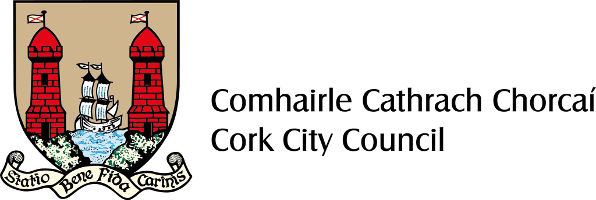Recently Available Collections
The following collection(s) have recently been processed, arranged and descriptively listed, and are now available to Readers in our research room, as with over 900 other collections.
Daniel MacCarthy (Glas) Collection
Reference: IE 627/PR70 Date: 1778 - 1940 (1973)
Level: fonds
Extent: 13 boxes: 9 series, 15 sub-series, 1719 files/items
Cork Wide Streets Commissioners
Reference: IE 627/WSC Date: c1820 - 1850s (1870s)
Level: fonds
Extent: 131 items
Paramount Cork City and County Official Directory and Almanac. Printed and published by the Paramount Printing House Ltd, Clarke's Bridge, Cork.
Reference: IE 627/SM1027 Date: 1946
Level: Item
Extent: 678pp
Mary Forrest Deposit
Reference: IE 627/SM1026 Date: 1913, 1944, 1945
Level: fonds
Extent: 5 items
St. Mary's Cemetery, Garrycloyne, Blarney, index of headstone inscriptions.
Reference: IE 627/SM1025 Date: (1700s) 2019-2023
Level: fonds
Extent: 1 vol. (126pp)
Julian Humphreys Photographs
Reference: IE 627/SM1024 Date: 1907-1930
Level: fonds
Extent: 2 items
William Morrogh Deposit
Reference: IE 627/PR119 Date: (1749) 1813 - c1876
Level: fonds
Extent: 17 items
'Westward Cork Migration by Sail' by John A. Sutton
Reference: IE 627/SM1021 Date: 1815-1860
Level: Item
Extent: c260pp
Cumann na mBan Shandon Branch and Cork District Council attendance/list of officials book
Reference: IE 627/SM1020 Date: 27 Jan 1918 - Jun 1920
Level: Item
Extent: 1 vol. (c20pp)
Henry Street Deeds (Lumley Deposit)
Reference: IE 627/SM1019 Date: 1784-1836, 1929
Level: fonds
Extent: 10 items
O'Connor Family, 179 Blarney Street, Cork.
Reference: IE 627/SM1018 Date: 1930 - 1983
Level: fonds
Extent: 4 items
Cork Commercial Buildings Company
Reference: IE 627/B646 Date: 1814 - 1894
Level: fonds
Extent: 5 vols. (1 box)
Cork Cine Club
Reference: IE 627/U773 Date: 2010 - 2020
Level: fonds
Extent: 73 items
Assorted historical material relating to Youghal, County Cork
Reference: IE 627/SM1015 Date: 1796 - January 1942
Level: fonds
Extent: 12 items
Castlemartyr Legion of Mary: Newsletters
Reference: IE 627/U772 Date: 1963-1977; 1995-1999 [gaps]
Level: fonds
Extent: 74 items
Smith Barry Cork Estates Ordnance Survey Maps West Riding
Reference: IE 627/SM1014 Date: nd [1840s - early 1900s]
Level: Item
Extent: 1 vol.
St Colman's Catholic Young Men's Society, Cloyne, County Cork
Reference: IE 627/SM1013 Date: 1899-1962
Level: fonds
Extent: 4 volumes
Photograph of workers from Bennett's Maltings, Ballinacurra on a visit to the Cork International Exhibition in 1902.
Reference: IE 627/SM1012 Date: 1902
Level: fonds
Extent: 1 photograph
TJ Murphy and Family Archive (Colm O'Sullivan Donation)
Reference: IE 627/PR116 Date: c1870s - 1920s (1958)
Level: fonds
Extent: 28 items
Kanturk Rural District Council
Reference: IE 627/RDC98 Date: 1900 - 1925
Level: fonds
Extent: 4 items
Drawing of river bed for construction of Youghal bridge.
Reference: IE 627/SM1010 Date: 1961
Level: Item
Extent: 1 item
Reprint of the 'Wonderland' catalogue from 1896, to mark the centenary year of the Victoria Hospital (1974).
Reference: IE 627/SM1009 Date: 1896 (1974)
Level: Item
Extent: 1 volume
Murphy / Anthony Donelan MP archive
Reference: IE 627/PR111 Date: 1860s - 1920s
Level: fonds
Extent: 40 items
Thompson's Bakery Photo. Album/Scrapbook
Reference: IE 627/SM1007 Date: (1920) 1926 - late 1970s/early 1980s
Level: Item
Extent: 1 vol. (32pp)
James Patrick Barry Collection
Reference: IE 627/SM1006 Date: 1921
Level: fonds
Extent: 3 items
Indenture relating to the marriage of George Crofts and Jane Johnson.
Reference: IE 627/SM1005 Date: 4 April 1788
Level: Item
Extent: 1 parchment deed
Lesley Stewart Howarth Collection
Reference: IE 627/SM1003 Date: 1928 - 1969 (2003)
Level: fonds
Extent: 16 items
Old Kilcrumper Graveyard, Fermoy
Reference: IE 627/SM1000 Date: 1700s - 1900s
Level: fonds
Extent: 3 vols.
Printed song sheet, ‘The Mitchelstown Proclaimed Meeting' by Henry Lyons
Reference: IE 627/SM998 Date: [1917]
Level: Item
Extent: 1 item
Joe Morgan Nadd IRA Ambush Map
Reference: IE 627/SM997 Date: ?1960s (Ambush was c7 March 1921)
Level: Item
Extent: 2 hard copies of map 70 x 50cm, also digital copy. (The original is 74 x 51cm)
Settlement, deed of Fee Ferme (fee farm), jointure from Maurice White of Kilrush and Kippane, Barony of Imokilly, Co. Cork to his wife Ellen White alias Barry
Reference: IE 627/SM996 Date: 1 Jun 1629
Level: Item
Extent: 1 skin

